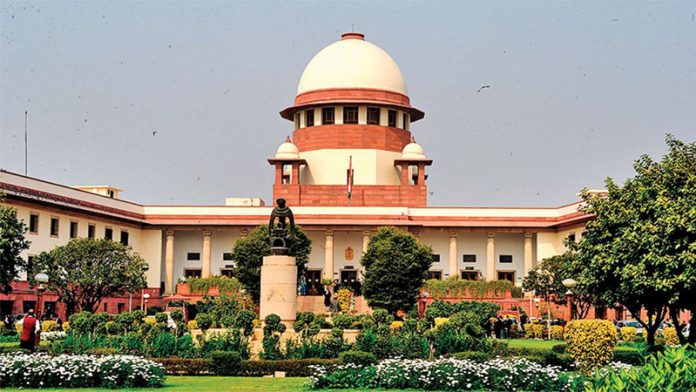Excelsior Correspondent
SRINAGAR, Dec 5: The Supreme Court has stayed judgment of the High Court whereby the Government order declining to change the pay scale of HC employees was quashed.
The Division Bench of the High Court of J&K and Ladakh had directed the Government to give pay scale to the employees of the court as are similarly placed employees of other High Courts of Delhi and Punjab & Haryana.
The judgment of the High Court has been challenged before the apex court by the Government in a Special Leave Petition (SLP). The Assistant Solicitor General of India appearing for the Government of J&K has argued that the High Court should not have issued directions for parity in pay structure with employees in the High Court of Delhi and Punjab & Haryana.
It was further argued that the interplay between provisions of Article 168 (2) of the Constitution of J&K as was in force before 31.10.2019 of Article 229 (2) of the Constitution of India should be examined together with the applicable rules for the employees of J&K High Court.
“Issue notice. In the meantime, as there is directions for compliance by the Division Bench, the operation of the impugned order is stayed until the returnable date”, Justice Hrishikesh Roy and Justice Sanjay Karol directed.
The writ petition was filed by almost 70 petitioners who are employees of the J&K High Court and are/were working as Jamadars, Orderlies and peons in the Court and with the conditions of service governed by the Jammu and Kashmir High Court Staff (Conditions of Service) Rules.
Their grievance was that they are in the pay scale of 65-100 (Jamadar) and 65-80 (Orderly) while their grade pay was revised from time to time and are drawing salary in the grade pay of 2610-3540 and 2550-3200 respectively. They submitted that Article 214 of the Constitution of India and the analogous provision of Section 93 of Constitution of Jammu and Kashmir, deal with matters relating to staff, officers and servants of the High Court.
Their contention was that persons similarly placed in the service of Delhi High Court are in the pay scale of 3200-4900 and that the petitioners are deprived of that pay scale for which they are legally entitled to, as their service conditions are similar to the Jamadars and Orderlies working in the Delhi High Court.
Division Bench of High Court while allowing their plea and quashing the committee constituted by the Government directed to forthwith resort the procedure as laid down in Article 229 and comply with the report prepared by the Committee constituted by the Lord Chief Justice which held that parity in pay structure as already reflected be given to the employees of this Court in consonance with those who are similarly employed with the High Courts of Delhi and Punjab & Haryana.
The DB of High Court had directed the parity of pay grade be done with a period of four weeks from the date the copy of this Order is served upon respondents, thereafter compliance report be filed before the Registrar Judicial of this Court.
The Committee which was constituted vide Government Order No. 562-GAD of 2019 dated 09.05.2019 under the chairmanship of Principal Secretary to the Government, Finance Department which met on 16.05.2019 which the court has quashed had recommended that pay scales of the post of High Court of Jammu and Kashmir cannot be changed as it will lead to similar claims from other employees of the erstwhile State.
The committee had also recommended that keeping in view the different nature of work staff of the High Court “special Pay” equivalent to 10% of the basic pay may be allowed in favour of the employees of the High Court and the ‘special pay’ shall remain at distinct element and shall not be merged with the basic pay.”
The DB while referring to Clause 2 of Article 229 provides that subject to any provision of law made by the Legislature of the State, the conditions of service of the officers and the servants of the High Court may be such, as may be prescribed by rules made by the Chief Justice of the Court or some other Judge so authorized by the Chief Justice.
“… in order to ensure the independence of Judiciary and especially the High Court, Article 229 vests the exclusive power of administration of the High Court in the hands of the Chief Justice of the High Court or his nominee and the said power cannot be whittled down at any cost and is only subject to the provisions of any law made by the legislature of the State and the proviso to Clause 2 of Article 229 where the Governor’s approval was required in matters where the proposal of the Chief Justice involved financial implications”, the DB had recorded.


